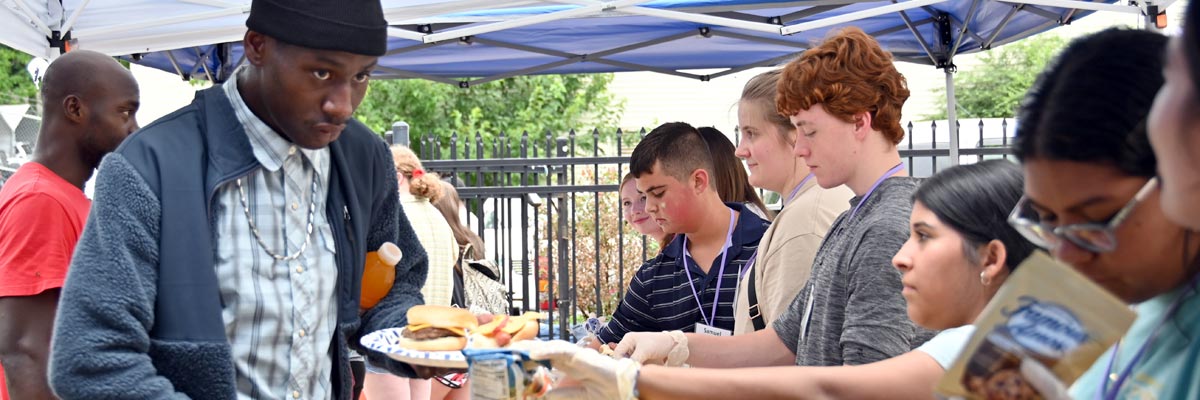Official Website of the
Catholic Diocese of Little Rock
Wednesday, 19th Week in Ordinary Time, Cycle II
Published: August 13, 2014
Bishop Anthony B. Taylor preached the following homily at St. John Catholic Center in Little Rock and during the White Mass at the Cathedral of St. Andrew in Little Rock on Wednesday, Aug. 13, 2014.
Download MP3 file to your device

Bishop Taylor
No doctor wants to lose any of his patients. So he or she will sit down with the more problematic patients and try to persuade them to stop smoking, lose weight and stop engaging in risky behavior before it's too late. In extreme cases, he may even try to enlist the help of the larger family — for instance, if an intervention is needed in order to convince the patient of the need for treatment for alcoholism, or if the patient seems to be confused.
But beyond a certain point, the doctor's hands are tied. For instance, an uncooperative patient must be released from a residential treatment center for reasons of "maximum medical benefit" when it becomes clear that due to his resistance to treatment, no further progress can be expected. But even then, the door to the doctor's office remains open and with such a patient, the story probably isn't over yet.
Today's Gospel follows a series of passages in which Jesus makes it clear that he doesn't want to lose anyone: not the most insignificant person, nor the worst sinner. Children may not have any weight in society, but unless we become like children, we will not enter the kingdom of heaven. Don't write off that troublesome black sheep. Leave the other 99 and go in search of the one who otherwise would be lost ... and by the way, in doing this you will also inspire those who are weak and vulnerable among the 99 who have not (yet) strayed. This is very important because all of us are tempted to stray and because sin will cause us to be lost. So cut off your hands and gouge out your eyes if by keeping them you're headed for hell!
Children may not have any weight in society, but unless we become like children, we will not enter the kingdom of heaven. Don't write off that troublesome black sheep.
In other words, no matter what the source of the problem, do whatever is necessary to save yourself and others. And by the way, Jesus is using hyperbole when he is speaking of amputation! His point is that the consequences of a spiritually unhealthy lifestyle are more serious than losing our eyes or cutting off our hands, so we must stop engaging is spiritually risky behavior before it's too late!
And this sets the scene for today's Gospel regarding our responsibility when we see another person ruining his life. Just like when dealing with a difficult patient, we should first confront him privately and only enlist the help of others when absolutely necessary. In the case of fraternal correction, the next step is to involve a couple of witnesses (as specified already in the Old Testament) and then failing that, to involve the entire community. But even when the offender won't listen to the community, all is not lost because we should still to treat him as a Gentile or as a tax collector.
And how did Jesus treat Gentiles and tax collectors? With mercy! "But for the grace of God, there go I!" And to proceed with such fraternal correction, the first step is prayer: private prayer while dealing with the matter privately, and then prayer in community once the matter has become public knowledge, because it is in the community that Jesus makes himself present to guide us in delicate matters of this sort: "Where two or three are gathered together in my name, there I am in the midst of them."
This, by the way, is true not only in dealing with individuals who have gone astray, but also with institutions — most of you recall the step-by-step approach we took in addressing the proposal to sell the Catholic hospital in Hot Springs to a for-profit secular health care system. And as we well know, there are many more — and even greater — challenges ahead of us in the health care field going forward. So let's keep Jesus' teaching in mind every step of the way:
- Jesus doesn't want to lose anyone, so we should not write off anyone or any institution.
- We are responsible for intervening when persons or institutions go astray. We should sit down and try to persuade them to make the necessary changes before it's too late.
- We should do so patiently, step by step. And the first step is prayer. Indeed, it is through ongoing prayer that Jesus will guide us throughout the process and lead us to a resolution that may well be unexpected, but is truly worthy of him!




